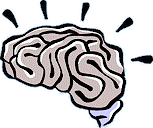
By Dr. Stephen Lundin, Ph.D
For my second BrainReady guest Blog contribution, I'd like to talk about something that is central to understanding how your brain works: Association.
If you were allowed to know only one thing about your brain, my vote would be for the following central concept: Your brain functions according to the laws of association, not the laws of linearity.
You don’t remember things based on the order they were learned, your remember things based on their associations.
If you seek to get the most from your brain, there isn’t anything bigger than this. But sometimes it takes a moment or two to realize the full implications of the law of association.
And so I am going to provoke you a bit and probe the impact of the knowledge that your brain works by associative mechanisms.
Imagine that you woke up one morning and you had lost your associative functionality, and needed to get dressed. You open your drawers and look at the array of items. Since you don’t know their relationship to each other and can’t recall the connection of these items to past uses and situations, it may be hard to decide what to put on and you would be clueless about the order. In fact the permutations and combinations of clothing selections would be in the millions. Yet every morning you get dressed.
That amazing feat is thanks to the law of association.
Or, perhaps you are talking with someone and a name slips from memory. You can feel it right on the edge but can’t quite see it in your mind's eye. You may even have a clear sense of the letter with which it starts. If you are my age you say something like, “senior moment” or “it’s a secret.”
The fact is that the associative chains in your mind become quite complex with age, and you have started your search in an area of your associative space that doesn’t have a direct connection to the answer. So what do we find ourselves doing? We let it rest and move on, or we consciously start our exploration from another point of origin.
(This happened to me just 90 minutes ago in front of 350 managing partners of accounting firms: I was finishing with a poem by Mary Oliver, except I couldn’t remember her name. The poem itself I remembered well, but not her name. I said to the group, "I bet reciting the poem creates an association that takes me to her name". Halfway through “The Journey” I suddenly remembered her name...)
The fact is that the associative chains in your mind become quite complex with age, and you have started your search in an area of your associative space that doesn’t have a direct connection to the answer. So what do we find ourselves doing? We let it rest and move on, or we consciously start our exploration from another point of origin.
Once you clearly see the associative reality you are ready to explore the implications. I will explore some of these implications in future contributions to BrainReady, but let me wet your appetite with a few quick observations:
- About 95% of the notes you take are unnecessary and the style most of us are taught to use when we take notes actually inhibits your brain from associating.
- Associations can be mental, emotional, social, spiritual and spatial. If you don’t understand the notion of an emotional association then you will never fully understand basic human communication and you will be frequently blindsided by your assumptions.
- The way you feed information into your brain is crucial. If you are not aware of the domain referenced filing cabinets that comprise the thing you call expertise then you are operating at a much lower level than you are capable of operating. (I just had a graduate school flash back association and remembered the name Ausabel. Why? Because it is associated with a concept referred to as “advanced organizers.” I just made the connection to my current work. Thank you associations.)
- And think about this rather bold statement: much of schooling is linear. Most of learning is associative.
Until next time,
Steve
(BrainReady would like to thank Dr. Stephen Lundin again for his second Blog contribution to BrainReady...thanks again, Dr. Tuna! And be sure to read his first piece, "A User's Manual For the Brain" by clicking here).
